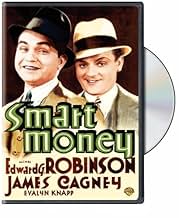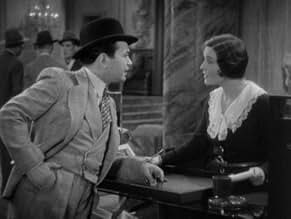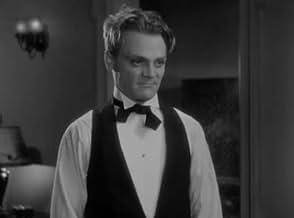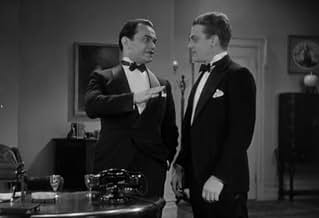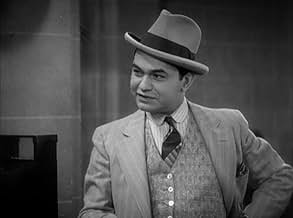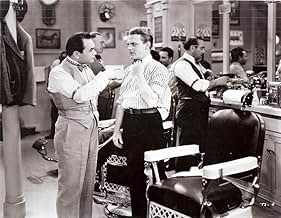AVALIAÇÃO DA IMDb
6,8/10
2,4 mil
SUA AVALIAÇÃO
Adicionar um enredo no seu idiomaA Greek barber has uncommon skills in playing poker and soon rises in the seedy world of illegal gambling, but pretty blondes remain his Achilles' heel.A Greek barber has uncommon skills in playing poker and soon rises in the seedy world of illegal gambling, but pretty blondes remain his Achilles' heel.A Greek barber has uncommon skills in playing poker and soon rises in the seedy world of illegal gambling, but pretty blondes remain his Achilles' heel.
- Direção
- Roteiristas
- Artistas
- Indicado a 1 Oscar
- 2 vitórias e 1 indicação no total
Billy House
- Irontown Salesman
- (as William House)
Ernie Alexander
- Bellboy
- (não creditado)
Edwin Argus
- Two-Time Phil aka Back-to-Back Shultz
- (não creditado)
Spencer Bell
- Suntan
- (não creditado)
Clark Burroughs
- Mr. 'Deep' River
- (não creditado)
Donald Cook
- Nick's Second Accomplice after Poker Game
- (não creditado)
John George
- Dwarf on Train
- (não creditado)
Eddie Hart
- Detective
- (não creditado)
Avaliações em destaque
Smart Money offers viewers a chance to see two well-known stars of the 1930s gangster film cycle, together in action: Edward G. Robinson and James Cagney. Mr. Robinson plays the lead in this picture, with Mr. Cagney offering excellent support.
But the real treat, in this writer's opinion, is the script by John Bright. Mr. Bright previously wrote the book 'Beer and Blood' that serves as the basis for Public Enemy. Since Bright is writing about his experiences growing up in Chicago, he clearly knows these types of characters first-hand. As a result, there is an authenticity in this picture that makes it just as important as Public Enemy or Little Caesar. Though in the case of this film, the emphasis seems to be on humor, rather than violence.
But the real treat, in this writer's opinion, is the script by John Bright. Mr. Bright previously wrote the book 'Beer and Blood' that serves as the basis for Public Enemy. Since Bright is writing about his experiences growing up in Chicago, he clearly knows these types of characters first-hand. As a result, there is an authenticity in this picture that makes it just as important as Public Enemy or Little Caesar. Though in the case of this film, the emphasis seems to be on humor, rather than violence.
Smart Money (1931)
A clever story about crime and misguided love (quasi-love) and about the love of money. What's wrong with that? Nothing here. With a remarkable performance by Edward G. Robinson (as usual), and supporting roles by a young James Cagney and a series of blondes who will more or less look alike at first. It might have been something of a formula production for the cast and crew, but it's during the lively pre-1934 sound era where, especially at a studio like Warner Bros., things manage to pop one way or another.
As much as this is a very good film, completely engaging and without gaffes or sentimental slow downs, it remains secondary for 1931 because of several interesting things. First, Robinson had just become famous for "Little Caesar" where he had a shining (and roughly similar) role as a sort of good guy gangster. Second, Cagney was in a rare supporting role, not yet famous for his breakout role in "The Public Enemy" later the same year. Both of these Warner films are better, all around. And a third twist is the appearance early on of Boris Karloff, who was about to launch to superstardom as, yes, "Frankenstein," a Universal film from later in, yes, 1931.
But you should watch "Smart Money" for what it does so well--tells a fast, multi-layered story with economy and life, and with great performances by the leads. The story and direction might fall short of classic, but it's still really solid.
A clever story about crime and misguided love (quasi-love) and about the love of money. What's wrong with that? Nothing here. With a remarkable performance by Edward G. Robinson (as usual), and supporting roles by a young James Cagney and a series of blondes who will more or less look alike at first. It might have been something of a formula production for the cast and crew, but it's during the lively pre-1934 sound era where, especially at a studio like Warner Bros., things manage to pop one way or another.
As much as this is a very good film, completely engaging and without gaffes or sentimental slow downs, it remains secondary for 1931 because of several interesting things. First, Robinson had just become famous for "Little Caesar" where he had a shining (and roughly similar) role as a sort of good guy gangster. Second, Cagney was in a rare supporting role, not yet famous for his breakout role in "The Public Enemy" later the same year. Both of these Warner films are better, all around. And a third twist is the appearance early on of Boris Karloff, who was about to launch to superstardom as, yes, "Frankenstein," a Universal film from later in, yes, 1931.
But you should watch "Smart Money" for what it does so well--tells a fast, multi-layered story with economy and life, and with great performances by the leads. The story and direction might fall short of classic, but it's still really solid.
Whilst "Smart Money" was being filmed, Edward G. Robinson had become a star at "Warner Bros," thanks to his film, "Little Caesar." James Cagney had just finished making "The Public Enemy" and that film hadn't yet been released. "Smart Money" isn't another gangster film as the story doesn't allow for that kind of character and Robinson isn't a hoodlum either. He is a professional barber who happens to be a gambler. For a while in the film, Robinson is small time but after avenging himself upon the con men who took all his money, he carves out a gambling empire with Cagney as his right hand man. The District Attorney has had enough of all the gambling and corruption that goes with it and he plans Robinson's downfall. His demise comes in a most unexpected way. Edward G. Robinson dominates "Smart Money" but James Cagney is right there after the half way stage. Their scenes are absolutely superb and I wish the two actors had made more films together. Boris Karloff makes a brief appearance as a gambler. Robinson is a very affable character and his wealth and power does little to change his disposition. The two leads carry this film but the story and narrative are far above average.
Robinson is a barber who owns his own barbershop, but who goes off to gamble with some real card-sharks. He goes to the hotel where the action is and meets the girl at the magazine counter who tells him what room the game is in, after the desk clerk tells him nothing like that is allowed in this hotel. Little does Edward know what's in store for him. Of course Robinson, as the barber, is great, and James Cagney is a secondary character with not much development to make him really interesting. But, it's Robinson that makes this film worth watching. He has such presence, and this is only a sample of what is yet to come in his career. The only problem I have with it is that its ending is rather anti-climatic. But as usual Robinson has the flair to take it all in stride and he makes the viewer feel honored to watch a master of his craft at work.
This is a nicely tailored story about the rise of Nick the Barber( a real barber)from the small gambling environs of Irontown to his rise to the big time gambling scene. Several things distinguish this film from just another mob movie. And that is just it for starters. This is not a mob movie. Edward G. Robinson's Nick is one of the kindest, most liked, and honest "crime" bosses you will ever see in film. Eddie doesn't shoot it up - in fact no one is murdered(Okay, I'm being a stickler here). This film also shows how difficult gambling can be as a profession. But at the film's heart is Robinson's performance. Nick is a sweet, at times naive, resilient guy with a weak/blind spot for pretty blondes. Aiding Eddie is none other than Jimmy Cagney playing Jack his friend and fellow business associate. Alfred E. Green does a rather deft job directing this very early sound picture. The pace is fast and the mood never compromised. The rest of the cast is quite good. Boris Karloff has a bizarre cameo as a man that has something Eddie just had - but we never know why Boris had it. It's a treat seeing Karloff and Robinson and Cagney in a brief yet memorable scene.
Você sabia?
- CuriosidadesDespite both Edward G. Robinson and James Cagney having spent most of their acting careers with Warner Bros., this was the only film the two acting legends appeared in together.
- Erros de gravaçãoIn the beginning of the film, when Nick finishes talking with the hotel clerk, he sits in an armchair in the lobby smoking. The big pot ashtray is on the left of him. In the next scene, the ashtray is on his right. He goes for it to the left, surprisingly finding it on the right, so he drops his cigar on the floor.
- Citações
Snake Eyes - Porter: Who'll give me a half a dollar for my hand?
Nick 'The Barber' Venizelos: Uh, I wouldn't give you a nickel for your whole body.
Principais escolhas
Faça login para avaliar e ver a lista de recomendações personalizadas
- How long is Smart Money?Fornecido pela Alexa
Detalhes
- Data de lançamento
- País de origem
- Idioma
- Também conhecido como
- Smart Money
- Locações de filme
- Empresa de produção
- Consulte mais créditos da empresa na IMDbPro
- Tempo de duração
- 1 h 21 min(81 min)
- Cor
Contribua para esta página
Sugerir uma alteração ou adicionar conteúdo ausente

